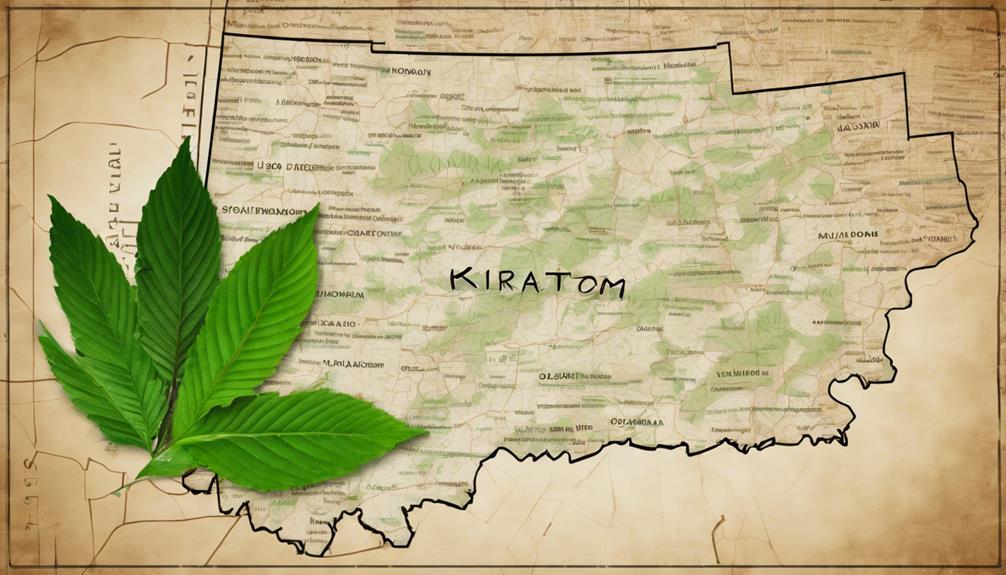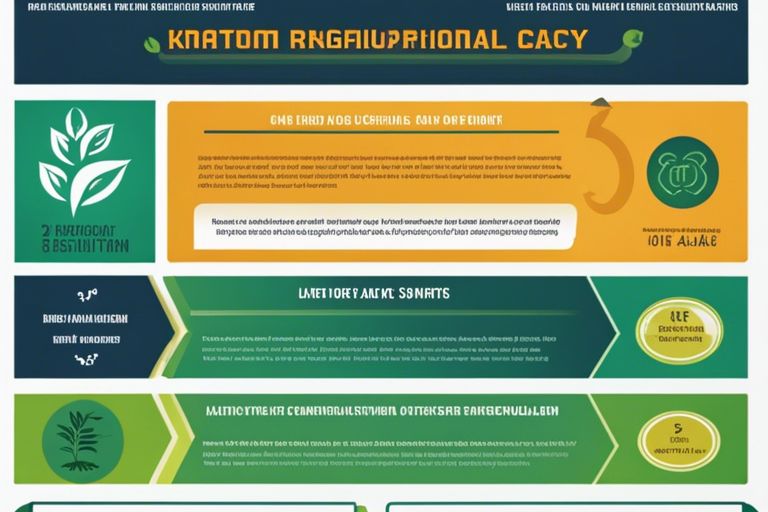Deprecated: mb_convert_encoding(): Handling HTML entities via mbstring is deprecated; use htmlspecialchars, htmlentities, or mb_encode_numericentity/mb_decode_numericentity instead in /home/users/kratomfiles/www/kratomfiles.com/wp-content/plugins/quick-adsense-reloaded/includes/template-functions.php on line 3552
So, you might be wondering if kratom is illegal in Indiana. Well, the answer is yes. However, the landscape surrounding its legality is not as straightforward as it seems. There are ongoing discussions and legislative efforts that could potentially change the current status quo. The nuances of this situation are worth exploring further to understand the complexities of kratom regulation in Indiana and its implications for both users and the broader community.
Key Takeaways
- Kratom is illegal in Indiana, classified as a Schedule I synthetic substance.
- Possession of kratom is a Class A Misdemeanor in the state.
- Efforts to decriminalize kratom are ongoing with House Bill 1500.
- Indiana remains one of five states where kratom is illegal.
- Lack of regulation exposes users to health risks and legal uncertainties.
Kratom Ban in Indiana Details
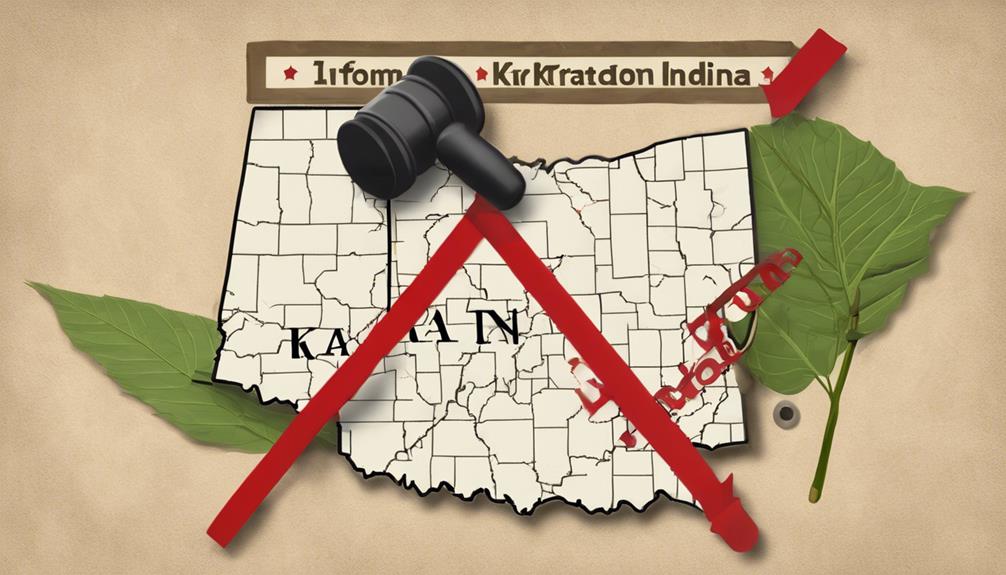
The ban on kratom in Indiana, implemented in 2014, classifies this substance as a Schedule I synthetic substance, leading to strict penalties for its possession and distribution. Under Indiana Senate Bill 305, kratom is categorized as a Schedule I controlled substance, putting it in the same legal classification as drugs like heroin and LSD. Possession of kratom in Indiana is considered a Class A Misdemeanor, with even harsher consequences if found near schools or minors. This means that the purchase, sale, and possession of kratom are all criminalized within the state. Despite attempts to change this with House Bill 1500, kratom remains illegal in Indiana. The stringent regulations surrounding kratom indicate the state's firm stance on its usage, reflecting concerns regarding its potential risks and effects. The laws in place aim to deter individuals from engaging with this substance due to its perceived dangers and harmful implications as a controlled substance.
Legislative Progress on Kratom Decriminalization
Progress towards decriminalizing kratom in Indiana has seen notable advancements with the passing of House Bill 1500 in the state's House of Representatives. This bill, which aims to decriminalize kratom, marks a significant step forward in the legislative process. State Rep Jim Lucas, a vocal supporter of kratom decriminalization, has been instrumental in advocating for this change. With the bill now moving to the Senate for consideration, the momentum for kratom decriminalization is gaining traction. Supporters of kratom legalization are hopeful that informed decision-making will prevail, leading to a more thorough understanding of the benefits and risks associated with kratom use. The push for regulated sales of kratom in Indiana is gaining support, as advocates emphasize the importance of responsible usage. As discussions continue at the legislative level, the outcome of House Bill 1500 could have a profound impact on the legal status of kratom in Indiana.
House Bill 1500 Update
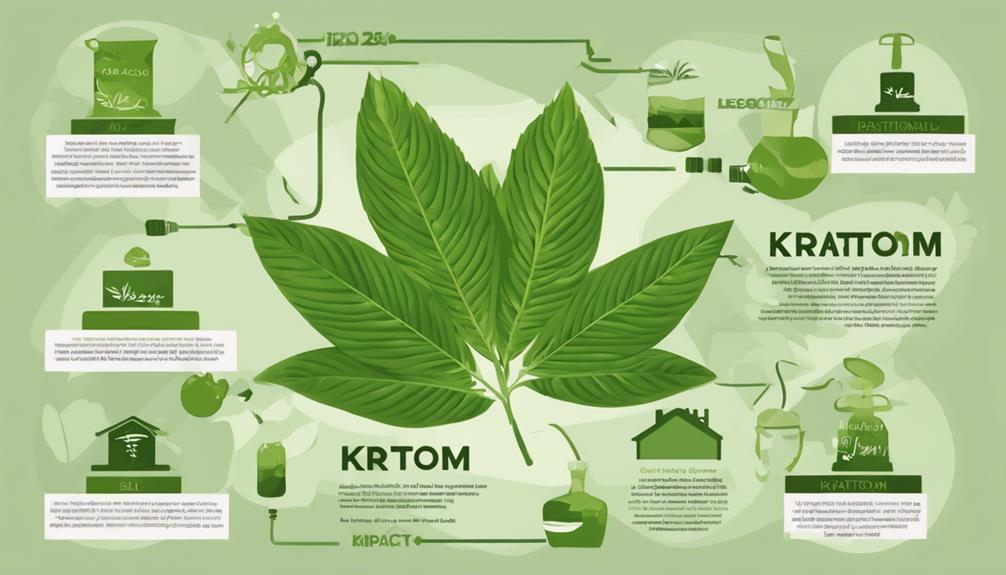
Supporters of kratom decriminalization in Indiana anxiously await the Senate's decision on House Bill 1500, a pivotal step towards potential legalization. This bill, with the backing of State Rep Jim Lucas, seeks to decriminalize kratom in the state. Having successfully passed in the House, the fate of kratom now rests in the hands of the Senate. The deliberations surrounding House Bill 1500 are vital as they could determine the future legality and regulation of kratom sales in Indiana.
Advocates for kratom decriminalization are actively engaging in efforts to make sure that legislators are well-informed about the benefits and safety of kratom. The push for the legalization of kratom in Indiana is gaining momentum, with supporters hopeful for a positive outcome in the Senate. The decision on House Bill 1500 will not only impact the legality of kratom but also shape the broader conversation around the regulation of natural substances for medicinal and recreational use. Stay tuned for updates on this developing legislative process.
Support for Kratom Legalization
Support for kratom legalization rests on the perceived public health benefits it offers, such as managing chronic pain and aiding in substance abuse recovery. Additionally, advocates argue that regulating kratom could open up economic opportunities in the industry. These points underscore the multifaceted reasons behind the push for kratom's legalization in various states.
Public Health Benefits
Advocates claim that kratom offers significant public health benefits, including managing chronic pain, aiding in substance abuse withdrawal, and alleviating anxiety. Testimonies, like John DeLao's, highlight successful addiction recovery with kratom. Users in states where it is legal rely on it for pain relief and other health benefits. Supporters argue that kratom can boost energy levels and ease withdrawal symptoms, backing its legalization. The positive effects of kratom have spurred advocacy for its availability, emphasizing its potential as an alternative treatment. Therefore, the push for kratom's legality in Indiana stems from its perceived contributions to public health, particularly in managing pain, aiding in addiction recovery, and reducing anxiety.
Economic Opportunities
The potential economic benefits of legalizing kratom in Indiana are substantial, with opportunities for new businesses, increased tax revenue, and enhanced economic growth. By regulating and taxing kratom sales, the state could create a thriving industry that not only generates revenue but also fosters job creation and boosts the local economy. Shifting sales from the black market to legal businesses would promote transparency and consumer safety while providing more opportunities for entrepreneurs to enter the market. The economic arguments for kratom legalization in Indiana emphasize the positive impact on businesses, employment, and state revenue. Below is a table illustrating the economic opportunities associated with kratom legalization:
| Economic Opportunities |
|---|
| New Business Creation |
| Increased Tax Revenue |
| Job Creation |
Current Status of Kratom in Indiana
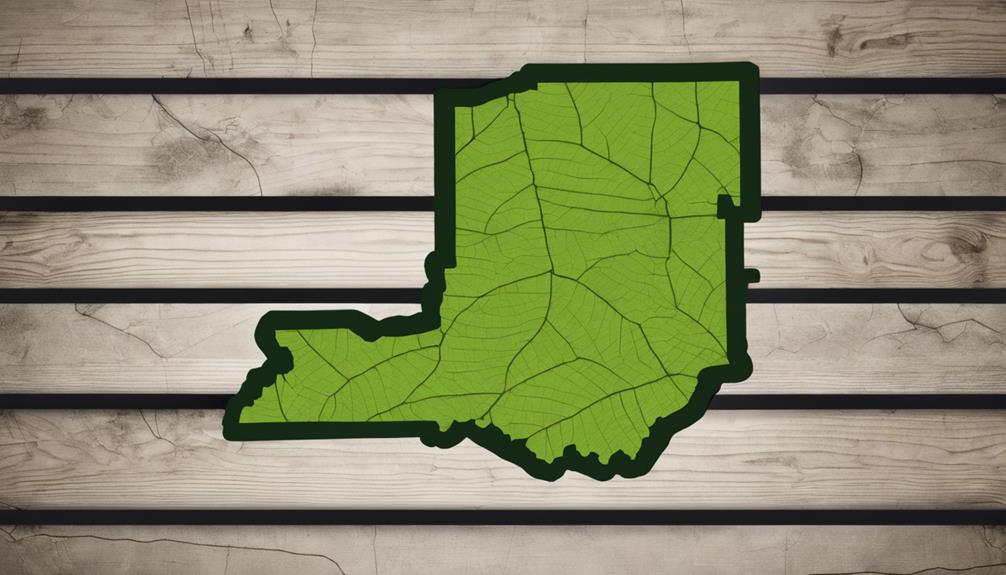
Despite attempts to decriminalize kratom in Indiana, the current status of this substance remains classified as a Schedule I synthetic substance, leading to strict penalties for possession. Since 2014, kratom has been labeled as a Schedule I controlled substance in Indiana, making its possession a Class A Misdemeanor. The severity of penalties escalates near schools or involving minors, with Indiana Senate Bill 305 reinforcing its classification. Despite efforts such as House Bill 1500 aimed at decriminalizing kratom, Indiana stands firm as one of the five states where kratom is illegal.
This legal status is intended to enhance safety; however, it raises concerns about the implications for individuals who consume kratom for various purposes. While the criminalization of kratom aligns with efforts to regulate substances with potential risks, it also restricts access to a product that some believe has beneficial properties. As debates continue on the appropriate legal status of kratom, consumers and advocates in Indiana remain vigilant about potential changes in legislation that may impact their access to this substance.
Implications of Kratom Criminalization
The criminalization of kratom in Indiana brings forth health risks as users might resort to obtaining it through unsafe means. This move can impact individuals who rely on kratom for various reasons, potentially leading to unintended consequences. While legal alternatives exist, the ban raises concerns about the well-being of consumers and the efficacy of prohibition measures.
Health Risks of Criminalization
Criminalizing kratom in Indiana raises significant health risks for consumers due to limited quality control and increased legal uncertainties. When a substance is pushed into the shadows of illegality, oversight diminishes, potentially resulting in contaminated or adulterated products reaching consumers. Additionally, the legal risks associated with possessing kratom in Indiana can lead to stressful situations for individuals seeking its purported benefits. Below is a table outlining the key implications of criminalizing kratom in Indiana:
| Implications of Criminalization | Description | Impact |
|---|---|---|
| Health Risks | Limited quality control may lead to harmful substances in kratom products | Increased risk of adverse health effects |
| Legal Uncertainties | Potential penalties for possession may deter seeking medical help | Legal challenges and uncertainties for consumers |
| Lack of Regulation | Absence of oversight can result in inconsistent product quality | Difficulty in knowing the safety and efficacy of kratom products |
Impact on Users
Dealing with the illegal status of kratom in Indiana presents significant challenges for users, impacting their access to safe and regulated products. The prohibition has led to an underground market where users may encounter impure or contaminated products, increasing health risks. With possession being a Class A Misdemeanor, kratom consumers face potential legal consequences, especially in areas near schools or involving minors. The lack of regulation further compounds the issue, exposing users to adulterated products that could potentially harm their health. Addressing these legal uncertainties forces individuals to consider the risks associated with possessing and using kratom in a state where it is deemed illegal, highlighting the complex implications for those who continue to use this substance.
Legal Alternatives Available
Exploring legal alternatives to kratom in Indiana reveals a growing trend towards seeking herbal supplements for various health benefits. The criminalization of kratom in Indiana has prompted individuals to turn to legal options like CBD products, kava, valerian root, turmeric supplements, and chamomile tea for pain relief, relaxation, anxiety, and stress management. With kratom unavailable, ashwagandha, passionflower, ginseng, and St. John's Wort have emerged as viable alternatives for those looking to address symptoms of depression and promote overall well-being. The shift towards these legal herbal remedies indicates a movement towards natural alternatives among individuals seeking relief from various health concerns in the absence of kratom in Indiana.
Risks Faced by Kratom Users in Indiana
Despite the illegal status of kratom in Indiana, users in the state face significant risks related to possession, consumption, and the potential exposure to impure products. Possession of kratom in Indiana is classified as a Class A Misdemeanor, particularly severe in areas near schools or involving minors. Despite this, an estimated 100,000 Indiana residents continue to consume kratom, putting themselves at risk of legal repercussions. Traveling from states where kratom is legal poses a risk of unwittingly violating Indiana law. The existence of a black market for kratom in Indiana amplifies the dangers for consumers, increasing the likelihood of being exposed to impure or contaminated products. Additionally, the lack of regulation in Indiana leaves consumers vulnerable to health risks, including potential exposure to adulterated kratom products. These risks highlight the importance of understanding the legal implications and potential dangers associated with the possession and consumption of kratom in Indiana.
Advantages of Regulating Kratom Sales

When it comes to regulating kratom sales, ensuring safety in consumption and implementing quality control measures are paramount. By setting standards for product quality and purity, consumers can have greater confidence in the kratom they purchase. These regulations also help in preventing the circulation of potentially harmful or tainted kratom products in the market.
Safety in Consumption
Regulating the sales of kratom is crucial for guaranteeing consumer safety through establishing quality standards and preventing exposure to impure or contaminated products. When it comes to safety in consumption, consider these key points:
- Quality Standards: Regulation guarantees that kratom products meet specific quality criteria set by authorities like the American Kratom Association.
- Lab Testing: Independent testing helps to identify contaminants, safeguarding consumers' health.
- Market Safety: Proper oversight through regulation protects users from adulterated or unsafe products, maintaining a trustworthy market.
- Stigma Prevention: Regulating kratom can prevent negative perceptions and promote responsible use, emphasizing the importance of keeping kratom safe.
Quality Control Measures
Implementing quality control measures through regulating kratom sales guarantees consumer safety and product integrity. By setting standards for production, packaging, and labeling, regulating kratom sales ensures that consumers receive a consistent and safe product. Quality control measures help prevent contamination, adulteration, and mislabeling of kratom products, thereby reducing potential health risks. Establishing regulations on kratom sales promotes transparency in the industry, allowing consumers to make informed choices about the products they purchase. This oversight fosters confidence in the safety and efficacy of kratom, ultimately benefiting both consumers and the industry as a whole.
| Quality Control Measures | Benefits |
|---|---|
| Ensures product safety | Prevents health risks |
| Promotes consumer trust | Guarantees product integrity |
| Establishes industry standards | Enhances transparency |
Advocacy Efforts for Kratom in Indiana
Advocates in Indiana are actively promoting the decriminalization of kratom, emphasizing its benefits and safety for users. The advocacy efforts for kratom in Indiana include:
- The American Kratom Association supports decriminalizing kratom in Indiana, advocating for access to this natural substance.
- Advocates highlight the positive impact of kratom, such as its affordability and effectiveness in providing relief from various symptoms.
- Consumers praise kratom for its potential therapeutic benefits, underscoring the importance of maintaining access to it.
- Advocates stress the necessity of implementing proper regulations for kratom to guarantee its safe use and distribution in the state.
These efforts aim to raise awareness about the advantages of kratom and urge lawmakers to take into account the valuable role it plays in promoting well-being. By emphasizing the benefits and safety of kratom, advocates hope to influence decision-makers positively regarding the decriminalization of kratom in Indiana.
Impact of Kratom Legalization on Residents

Despite kratom being illegal in Indiana, its usage continues among an estimated 100,000 residents for various purposes, exposing them to legal risks and potential penalties. The prohibition of kratom forces individuals to engage with the black market, where the quality and safety of products are not regulated. This poses significant risks, as products obtained through illicit channels may be impure or contaminated, leading to adverse health effects. The lack of oversight also means that consumers are at risk of unknowingly ingesting adulterated substances, further compounding the potential dangers associated with kratom use.
What are the laws regarding kratom in Indiana and how does it differ from operating a kratom bar in Grand Junction?
In Indiana, kratom is classified as a synthetic drug and is banned for purchase and possession. However, operating a kratom bar in Grand Junction, Colorado, is legal as long as the establishment follows state and local regulations. The laws regarding kratom vary greatly between these two locations.
What is the Legal Status of Kratom in Different States?
The legal status of kratom in different states varies. As of now, kratom legality in New York is legal, with no pending legislation to ban it. However, it’s important to keep in mind that the laws regarding kratom can change, so it’s always best to stay updated on the current regulations.
What is the Legal Status of Kratom in Different States?
The kratom legality in New York remains a topic of debate, as the state currently prohibits the sale and possession of kratom. It is classified as a Schedule I controlled substance, making it illegal to purchase or use kratom within the state. However, there are ongoing efforts to change this status through legislative measures.
Future Outlook for Kratom in Indiana
The uncertain future of kratom in Indiana hinges on the stalled House Bill 1500, which aimed to decriminalize its use but faced resistance in the Senate. The fate of kratom in Indiana remains uncertain, but several key factors could influence its future:
- Decriminalization Efforts: The push for decriminalization highlights the importance of recognizing kratom's potential benefits.
- Proper Regulation: Establishing appropriate regulations for kratom sales is essential to keeping the substance safe and accessible.
- Advocacy: Continued support from supporters like State Rep Jim Lucas is essential for advancing decriminalization efforts.
- Public Opinion: The stance of the public on kratom could play a significant role in shaping its future legality in Indiana.
As the debate on kratom in Indiana continues, the eventual outcome will likely depend on how these factors are navigated and whether a balance between decriminalization and proper regulation can be achieved.






